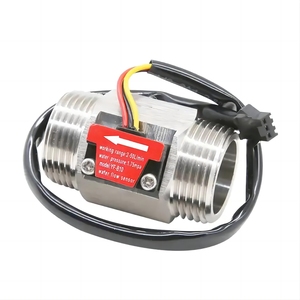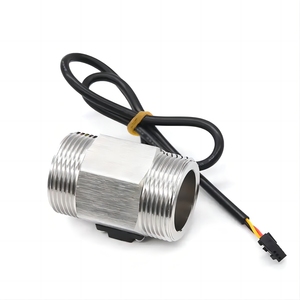
All categories
Featured selections
Trade Assurance
Buyer Central
Help Center
Get the app
Become a supplier

(3312 products available)








































Mini flow meters come in diverse types. They include:
Positive Displacement Meters
These sample containers work by isolating a fixed volume of liquid and then measuring the volume that is displaced. They are very precise when working with small amounts of fluids and thus suitable for highly viscous liquids like oils and greases. Positive displacement meters offer high levels of accuracy and are especially suitable for measuring high viscosity fluids. They tend to be bulkier and more complex as compared to some other flow meters.
Gear Meters
Gear flow meters utilize two or more gears that rotate within a chamber to measure the flow of liquid. As the liquid enters, it pushes the gears, and the amount of liquid that passes by is determined by counting the number of revolutions. Gear flow meters are great for precise measurements in industrial settings. They can handle moderate temperatures and pressures, but not extreme conditions since such conditions can lead to wear and tear of the gears.
Rotary Vane Meters
They work in the same way as gear meters, but instead of gears, they use vanes attached to a rotating element. When the liquid flows in, it pushes the vanes, and the amount of flow can be measured by calculating how many revolutions the spindle has made. These are great for measuring viscous liquids like oils. Rotary vane meters are used in automotive, aerospace, and manufacturing industries for their accuracy.
Titanium Mini Flow Meters
Titanium flow meters are strong yet lightweight. They make a great choice for measuring liquid or gas flow in tough environments. Since titanium does not corrode, it can work in extreme temperatures. This durability means there is no need for frequent replacements. Titanium flow meters remain reliable even in spaces that are too hot, too cold, or could damage other materials.
Mass Flow Meters
This mini flow meter measures mass instead of volume. They can handle gases and liquids and provide direct readings of the mass flow rate. Mass flow meters are useful when accuracy is vital or when material properties change. They are especially suited for chemical processing where reactions depend on precise mass measurements.
Mini flow meter construction uses various materials. Mini flow meter durability differs depending on the identified materials. They include:
Housing Materials
Mini flow meters frequently use stainless steel for their housing. Stainless steel is also known for its sturdy construction and resistance to rust. This enables stainless steel flow meters to work in tough conditions, such as factories or outdoor areas where there may be moisture or corrosive chemicals. Additionally, there is a type of stainless steel called 316 stainless steel, which contains nickel and molybdenum. This makes it even better at resisting corrosion than regular stainless steel. Therefore, 316 stainless steel is often used in flow meters meant for coastal areas or chemical processing where there is a lot of exposure to salt or harsh chemicals.
Plastic Components
Some mini flow meters have plastic parts made from materials like polycarbonate or PVC. They are light and less expensive to manufacture. These plastic flow meters work well for measuring water or other liquids that aren't too hot and don't damage plastic. Although plastic materials are not as strong as stainless steel, they still provide enough strength for many agricultural, HVAC, or light industrial applications.
Titanium
As one of the strongest metals, titanium is also very light. It does not corrode even with long exposure to saltwater, making it ideal for flow meters used in marine environments. Titanium is stronger than steel, very light, and doesn't rust. Both titanium and titanium alloys provide excellent durability for miniature flow meters used in extreme conditions or for measuring corrosive liquids.
Ceramic Materials
Ceramic flow meters are very durable and resistant to wear and tear. They work well for measuring abrasive materials like sand, slurries, or powders which can damage other types of flow meters. Although they are often more fragile and can break under impact, they are still one of the strongest materials available. Advanced ceramics are very tough and last a long time, even with extremely abrasive substances passing through.
Seals and Gaskets
To maintain metering pump
Selecting the appropriate water flow meter involves several strategic decisions. Some of them include:
Positive Displacement Meters
Positive displacement meters are ideal for measuring the flow of viscous liquids such as oils, lubricants, and some chemicals. This is because they provide accurate measurements by trapping specific amounts of liquid and releasing it. This method prevents any formation of bubbles even in highly viscous substances.
The Application
The application determines the choice of a mini flow meter because different industries have varying requirements. In the food and beverage industry, sanitary flow meters with smooth surfaces for easy cleaning are necessary. In the petroleum and petrochemical industries, engravings and other formations are a concern, and gear flow meters are suitable.
Fluid Characteristics
Depending on type, characteristics such as viscosity, temperature, and chemical compatibility heavily influence the choice of mini flow meter. For instance, mass flow meters handle gases and liquids with changing material properties. On the other hand, turbine flow meters are suitable for fluids with low viscosity. It is, therefore, important to know the flow material well so as to choose the right meter. This prevents damage and ensures precision in measurement.
Accuracy Requirements
Different applications require different levels of accuracy. For example, when measuring fuel in an aircraft, the measurement must be precise to avoid dangerous situations. Some meters, such as mass flow and gear meters, provide a high level of accuracy, while others do not.
Flow Rates
The required flow rate depends on the application. A flow meter with high output capacity is needed where high flow rates are required and vice versa. Choosing the right flow rate will prevent meter from being overloaded or underutilized. This ensures smooth operation for the intended use.
Mini flow meters have various industrial applications. Here are some of them:
Petroleum and Petrochemical Industries
In these industries, mini flow meters help measure and control fuel and oil flows accurately. This minimizes wastage and boosts work efficiency. The agriculture industry also applies these meters in irrigation systems to measure water flow. This ensures crops receive the right water amounts and boosting overall production.
Food and Beverage
Flow meters are used to measure milk, juices, and sauces. This ensures the products are of the right consistency. In these industries, mini flow meters also measure ingredients such as grains in bulk and liquids such as oils. They ensure precise usage and a high quality of products. Water treatment facilities also use them to monitor chemical additions like chlorine. This assures safe drinking water.
Pharmaceutical Industry
They measure expensive liquids like solvents and acids used in drug production. They ensure accurate measurements and fewer wastes. They also work for both finished and raw liquids. In the HVAC systems, mini flow meters measure the flow of refrigerants and condensing fluids. This assures efficiency and comfort.
Power Generation
In this industry, mini flow meters work by measuring water and steam flows in both thermal and hydroelectric power plants. This gives your plants the right amounts of water for energy production. In mining and metallurgy industries, they measure slurries and other fluids to ensure precise mineral extraction.
Cooling Systems
In manufacturing industries, they measure coolant flows to prevent overheating of machines. In chemical processing industries, mini flow sensors monitor and control liquid flows to ensure reactions occur as intended. This maintains the product quality and increases safety. Lastly, in the engineering and construction industries, they measure cement and grout flows for effective construction work.
A1. Mini flow meters are devices used to measure the flow of liquids and gases in various pipelines. They make sure industries have accurate measurements of what they are using. This helps avoid wastage and guarantees efficiency. Mini flow meters work well in producing precise measurements, even in small-scale operations.
A2. Although the two are closely related, they differ in certain ways. A flow meter measures and shows fluid movement in a system, giving readings of flow rates. On the other hand, a flow gauge is a flow meter with readout limited to indicating only flow presence or absence, not the detailed fluid rate.
A3. Volumetric flow rate is the measure of volume of fluid which passes through a given area in a span of time. It indicates the speed at which a fluid travels in a system. Hence, measuring it helps users identify how much fluid is used. This keeps systems working well.
A4. Flow meters mainly measure the flow rates of liquids and gases. Some advanced types are able to measure even solid particle flows. In industrial applications, flow meters commonly measure water, fuels, chemicals, air, steam, and other gases. This guarantees optimal performance in various engineering systems.